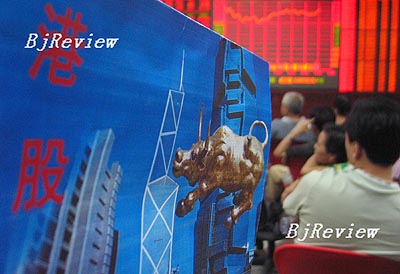|

Just after the National Day holiday (October 1-7), Harvest Fund Management Co. Ltd. launched its equity fund-Harvest QDII-in a bid to invest in overseas stock markets. Notably, it is the first joint venture QDII investing mainly in the Hong Kong stock market.
Li Kai, fund manager of Harvest QDII, stated that this fund will largely invest in Chinese companies listed in the overseas markets, and that 60-100 percent of the fund will be invested in stock markets, including those listed in Hong Kong, the United States and Singapore.
Li said there are around 1,250 types of shares to choose from, and they will narrow their list down to 100-200 they believe are worth investing in. Overseas investment consulting firm DWS will help Harvest construct their investment structure.
This new QDII fund has received much attention since the recent boom in the Hong Kong stock market inflated investor confidence. The Harvest QDII began raising money on October 9 and collected over 70 billion yuan ($9.33 billion) on the same day, far outpacing the goal of $4 billion.
Li said although the Hong Kong stock market has grown much this year, the price/earning ratio is still reasonable and some assets are undervalued. Li believes the market trend will not change in the foreseeable future.
Harvest Fund Management is not the only one attracted by the Hong Kong market. The fourth QDII fund operated by the joint venture of JP Morgan Asset Management and Shanghai International Trust & Investment Co. Ltd. was distributed on October 15, with Hong Kong as its major investment market. Its manager Yang Yifeng claimed that judging from a global perspective, the Asia-Pacific markets, especially Hong Kong, are the most attractive markets in the world.
Li Cheng, a fund investor, said that in the past the QDII funds were not as profitable as the funds investing in the mainland market. However, when individuals begin to trade directly on the Hong Kong market in the future, the QDIIs investing in the Hong Kong stock market are expected to earn higher profits than before. "It is complicated for an individual to invest in the Hong Kong stock market, because you have to go through various procedures," said Li. "It is much easier to invest in QDII funds."
Indirect investment
During the weeklong holiday, the mainland stock market was closed while the Hong Kong market soared. Partly affected by the surging U.S. stock market, the Hang Seng Index broke 28,000 points for the first time and closed at 28,199.75 on October 2, its highest mark in history.
The Hong Kong stock market climbed over 28,000 points, up from less than a mark of 20,000 points in mid-August. Zhang Jiabin, a market analyst with CITIC-Prudential Fund Management Co. Ltd., explained that when the mainland stock market was closed, money flew into the Hong Kong market. Because there is no definite timetable for when mainland individuals can directly invest in Hong Kong and the Hong Kong market keeps booming, many investors are choosing to buy QDII funds in order to invest in Hong Kong indirectly.
On the morning of October 9, Li Cheng attempted to open the webpage of the Bank of China to buy shares of Harvest QDII. "I couldn't open the website because there were too many visitors," he said. Li gave up trying on the Internet and instead went to the nearest branch of the bank.
"There was also a long queue in front of the bank counter and many people were inquiring about the fund," said Li.
| 